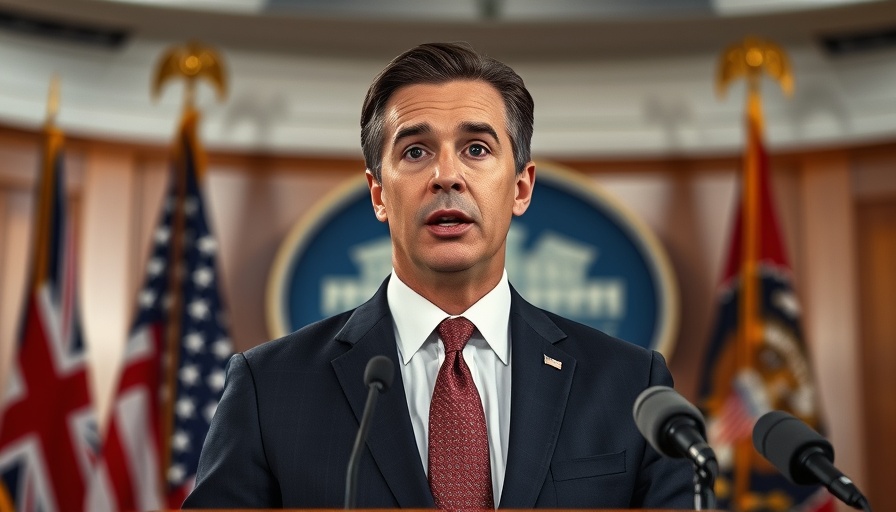
The Current State of Iran's Nuclear Program: What We Know
As geopolitical tensions continue to rise, the situation regarding Iran's nuclear capabilities remains a significant concern for both national and international observers. The recent military actions undertaken by the United States have left many questions unresolved about the extent of the damage inflicted on key facilities and the implications for Iran's nuclear aspirations. Reports indicate that a bombing raid on critical sites was designed to significantly hinder Iran's enrichment capacities, yet conflicting narratives from U.S. officials add layers of complexity to an already intricate issue.
In 'Hegseth claims CNN spun Iran reporting,' the discussion dives into military actions and intelligence assessments on Iran, prompting us to analyze both perspectives for deeper understanding.
A Bipartisan Divide on Military Success
Following a confidential briefing on the recent airstrikes, U.S. senators emerged with starkly different interpretations of the operation's success. Republican Senator Lindsey Graham asserted that the strikes had "obliterated" key Iranian sites, while Democratic Senator Chris Murphy countered that the administration may have overstated the damage. This bipartisan split highlights the challenges in interpreting military intelligence and the inherent biases that can skew perceptions of success in combat scenarios.
Media Scrutiny and Accountability: A Double-Edged Sword
The responses from Secretary of Defense and the Joint Chiefs chairman illustrated the tension between military objectives and media interpretations of the facts. Secretary of Defense Pete Hegseth criticized the press for what he termed a "missed historic moment," alleging that media outlets, particularly CNN and The New York Times, were more focused on sensationalism than on accurately reporting the success of the military operation. This contentious exchange raises pertinent questions regarding the role of media in conflict reporting and the need for accountability among journalists, especially when national security is at stake.
The Intelligence Landscape: Understanding Preliminary Assessments
A critical aspect of the ongoing discourse revolves around the nature of intelligence assessments. It was revealed that the Defense Intelligence Agency (DIA) provided a preliminary report that came with significant caveats, describing its findings as low-confidence and evolving. The DIA's assessment suggested that Iran's nuclear program had taken a hit, yet emphasized that further analyses would be required to fully understand the ramifications. Such nuanced communication is essential in dispelling misconceptions while also ensuring the integrity of public understanding of military effectiveness.
Success or Spin? The Public Narrative on Military Action
The remarks made by military leaders and the contention over media reports highlight a pervasive narrative contestation. Many military analysts regard these operations as adept and strategic, questioning why the significant accomplishments of U.S. air power are sometimes overshadowed by criticism from the press. Effective damage assessments and military achievements stand in stark contrast to the portrayal of ineffectiveness, fuelling further mistrust between military officials and media representatives.
Diverse Perspectives: Hearing from Experts and Analysts
Voices from various quarters—including experts like David Albright—have brought additional insights into the effects of the air strikes. Albright, a former U.N. weapons inspector, viewed the military engagement as a substantial blow to Iran’s nuclear capabilities, suggesting that the damage inflicted by U.S. strikes could set the program back considerably. This perspective lends credibility to the notion that while complexity exists within intelligence assessments, the mission's operational goals may very well have been achieved.
Looking Forward: The Implications of Military Success
The future of Iran's nuclear program remains uncertain as assessments continue to emerge. Diplomatic discussions will undoubtedly weigh heavily on how international stakeholders must respond moving forward. What is more critical, however, is the balance between transparent reporting by the media and accurate reflections of military success, both of which are vital to public trust and understanding.
In conclusion, while the video "Hegseth claims CNN spun Iran reporting" captures the intensity of this debate, the intricate details surrounding military actions and intelligence assessments should compel us to remain vigilant and critical consumers of news. As the situation evolves, it is our responsibility to engage with these narratives thoughtfully, ensuring that the complexities of geopolitics are honored and accurately conveyed.
 Add Row
Add Row  Add
Add 






Write A Comment